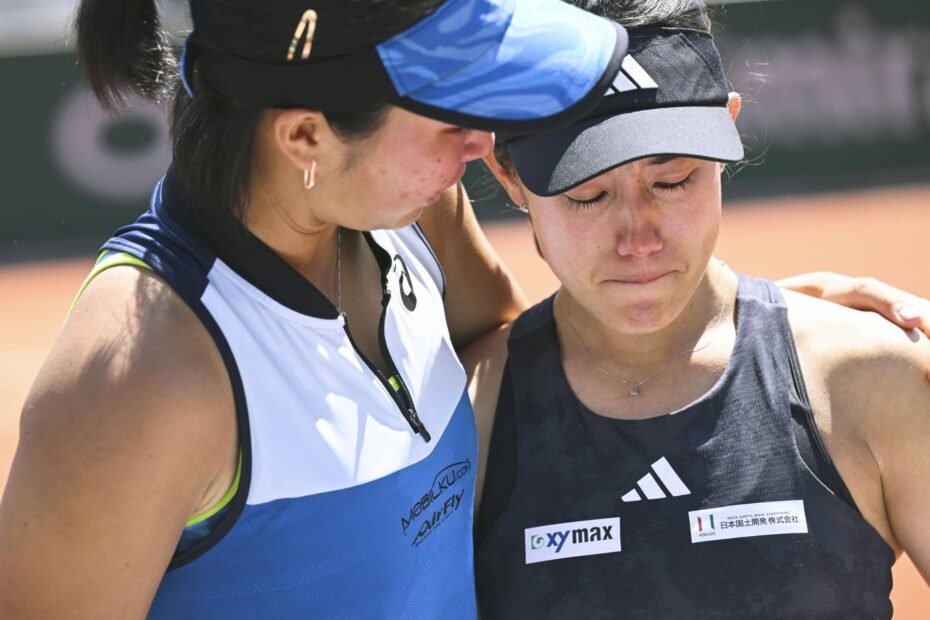In a surprising turn of events at the French Open, Japan’s Miyu Kato and her doubles partner Aldila Sutjiadi from Indonesia were disqualified from the tournament after Kato accidentally struck a ball girl with a ball during their third-round match. The incident, which took place at Roland Garros on a Sunday, unfolded in front of spectators and sparked a heated debate about player responsibility and the appropriate consequences for such occurrences.
Kato and Sutjiadi, seeded 16th in the women’s doubles, were leading their opponents, Marie Bouzkova and Sara Sorribes Tormo, 7-6 (7-1) 1-3 in the third set when the incident transpired. Unaware that the ball was coming her way, the ball girl was struck directly on the head, leaving her visibly distressed and in tears.
Umpire Alexandre Juge initially issued Kato a warning for her actions, believing that it was an unintentional mishap. However, Bouzkova and Sorribes Tormo, standing on the opposite side of the net, voiced their concerns and demanded the disqualification of their opponents. The gravity of the situation became apparent as Sorribes Tormo pointed out that the ball girl was crying and had blood on her.
Juge, compelled to reassess the situation, approached the sobbing ball girl to assess her condition. After speaking with her, he returned to his chair and made the difficult decision to disqualify Kato and Sutjiadi, abruptly ending the match. Bouzkova, reflecting on the incident, expressed her sympathy and acknowledged the unfortunate circumstances, particularly the distress experienced by the ball girl.
This disqualification incident reignited memories of similar incidents in tennis history, such as Novak Djokovic’s disqualification from the 2020 US Open and Tim Henman’s disqualification at Wimbledon in 1995. The International Tennis Federation (ITF) strictly prohibits players from violently, dangerously, or angrily hitting, kicking, or throwing a tennis ball within the tournament premises except during the reasonable pursuit of a point in a match.
In the aftermath of the incident, Kato took to Twitter to offer a heartfelt apology to the ball girl. She expressed sincere regret for the unfortunate mishap and emphasized that her actions were entirely unintentional. Kato, aware of the consequences, also acknowledged the penalties imposed by Roland Garros, which included the forfeiture of prize money and ranking points. Alongside Sutjiadi, Kato attempted to plead their case to French Open officials, emphasizing the accidental nature of the incident and personally apologizing to the ball girl.
Criticism arose regarding Bouzkova and Sorribes Tormo’s involvement in the disqualification decision. However, the pair defended their actions, asserting that they had merely reported the incident to the umpire. The crowd, divided in its response, booed the decision to disqualify the 16th seeds yet applauded them off the court.
The incident generated widespread debate about player responsibility and the consequences for unintentional actions. Tennis is a sport where players have a duty to ensure the safety of everyone on the court, including ball girls and boys. Accidental incidents, while rare, highlight the potential dangers when split-second decisions go awry. The incident involving Kato and the ball girl prompted discussions about how the rules and penalties should be applied in such cases.
Kato’s emotional state following the disqualification was evident in subsequent matches and interviews. She struggled to discuss the incident, often breaking down in tears. Her mixed doubles partner, Tim Puetz, provided support and expressed relief when they were allowed to continue competing. Fellow players rallied around Kato, offering words of encouragement and emphasizing the importance of moving forward and focusing on her tennis.
Ultimately, the disqualification at the French Open serves as a stark reminder of the responsibility that players bear on the court. While Kato’s actions were unintentional, the potential consequences of accidental incidents highlight the need for heightened awareness and control. The incident ignited a broader conversation about how the tennis community should address such situations, striking a balance between accountability and understanding.
As the sport evolves, the incident involving Miyu Kato and the ball girl will serve as a significant moment in the ongoing dialogue surrounding player conduct, safety, and the appropriate repercussions for accidental actions. It serves as a call for continued reflection and improvement, ensuring that tennis remains a sport that upholds the highest standards of sportsmanship and accountability.







The final say on the Kato infringement ought to have been referred to a tournament authority beyond the match umpire.This incident may help in streamlining such appeals in future.